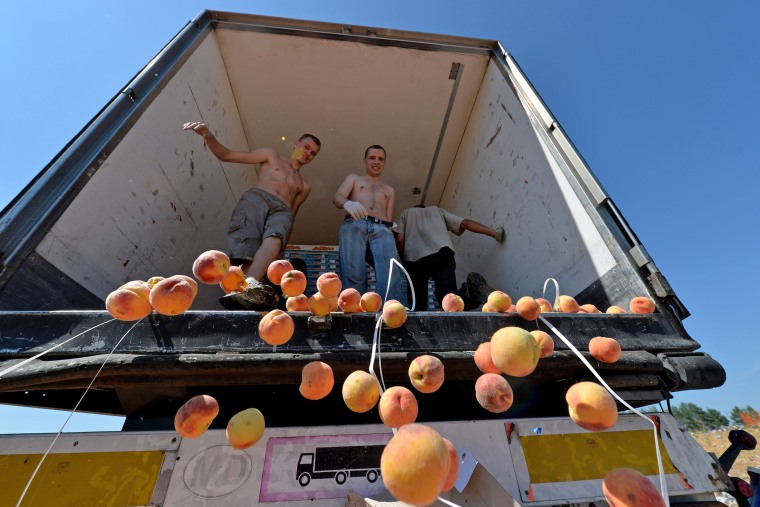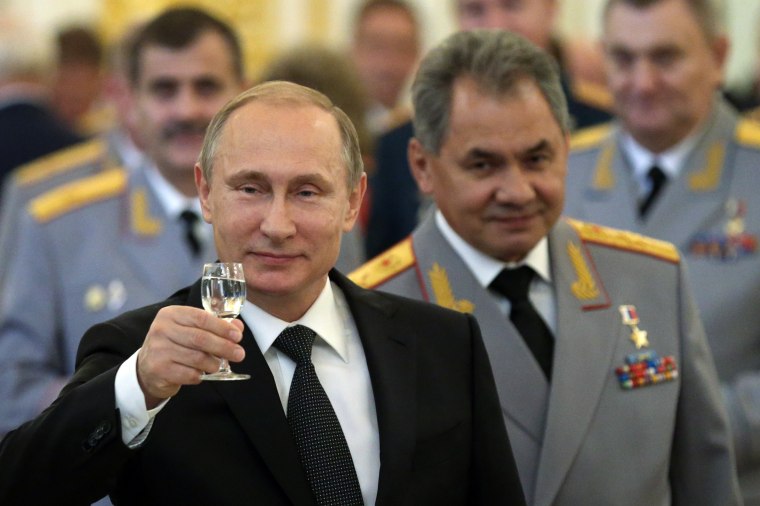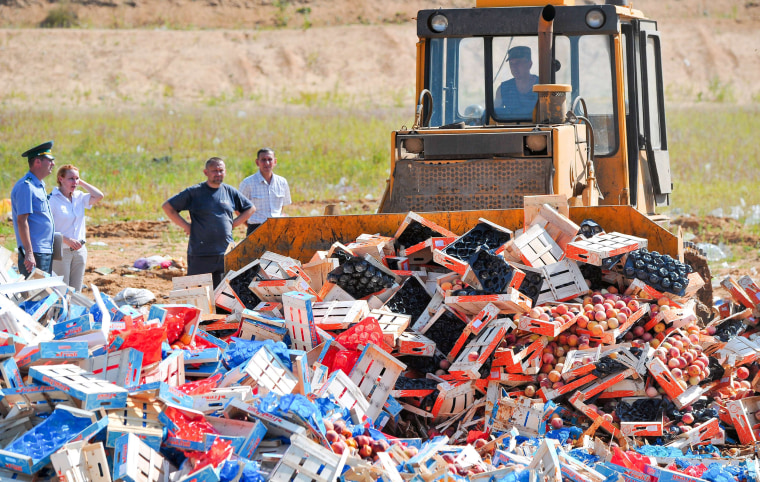Russia has taken on the United States and Europe in a sanctions war, which has recently spilled into some decidedly odd public stunts: bulldozed cheese, burned fruit, even euthanized ducklings.
NBC News' Moscow-based producer Alexey Eremenko explains what's behind the food crusade and looks at 10 stunning stories that it's produced.
Why does Russia destroy food?
The Kremlin has embargoed imports of most foodstuffs from Western countries since 2014 in retaliation for Western sanctions against Russia.
The counter-sanctions are supposed to hit agriculture in the offending nations while boosting domestic production.

But why the Western sanctions?
The sanctions were a response to Russia's decision to annex Ukraine’s Crimea peninsula at gunpoint in 2014, as well as Moscow’s support of pro-Russian separatists in eastern Ukraine.
The West has blacklisted dozens of President Vladimir Putin’s affiliates and limited Russia’s access to foreign capital and state-of-the-art technologies.
What countries were blacklisted by Russia?
The United States, all 28 EU members, Australia, Albania, Canada, Iceland, Lichtenstein, Montenegro, Norway and Ukraine — though the ban for Ukraine was suspended until 2016.
Related: Russia's Putin: U.S. Is Acting Like Soviet Union After WWII
What has Russia banned?
Meat (except mutton), fish, shrimp, oysters, dairy products, fruits and vegetables.
Caviar, chocolate, coffee, pastry, spaghetti and alcohol are exempt; you can still get your Snickers and Jack Daniels in Moscow.
Has it worked?
EU farmers have lost an estimated 5.5 billion euro ($6 billion) due to Russia’s embargo, but that pales in comparison to Russia's losses from the Western sanctions — a staggering $50 billion and counting, Finance Minister Anton Siluanov told CNBC earlier this year.
Russia has no food shortages, but food selection has dwindled and prices have gone up almost 30 percent since early 2014.
Is it the first time Russia has lashed out like this?
Far from it. The country spent most of 2000s in puny trade wars with its post-Soviet neighbors, banning things like Moldovan wine, Georgian mineral water and Estonian fish.
But it is the first time Russia has taken on most of the developed world.
Why destroy sanctioned food?
Many Russians are asking the same question and have lobbied to give contraband food to the poor, which number 23 million in Russia.
But Russian officials say smuggled foodstuffs have no health certificates and can be dangerous. Besides, officials would likely to steal food during redistribution, Agriculture Minister Alexander Tkachyov admitted.
Is Russia the only country to burn food?
Nope. Smuggled food is routinely destroyed throughout the world — the U.S., Britain and Australia also do it. But only Moscow makes a publicity stunt out of it.
10 Facts About Russia's Sanctions War
Geese vs. bulldozer
More than 600 tons of food have been destroyed so far, from apples and cheeses to kiwi and pig hearts. Most are destroyed in bulk, but in Tatarstan, 10 officials took a whole day to destroy three grilled geese from Hungary with a bulldozer.
Even the Kremlin acknowledged it was not the most efficient use of civil servants’ time, so the officials were reprimanded.
Food hunts
Pro-Kremlin activists embraced sanctions with the enthusiasm and began combing supermarkets for banned food.
It didn't work out well: the West-bashing activists touted Western smartphones and could not distinguish between sanctioned and friendly countries. And it may get worse: Russian Cossacks, a pro-Kremlin quasi-militant group with a culture of violence, pledged to join the raids.
Bootlegged cheese
The sanctions have created a thriving smuggling economy — Western food is simply re-labeled as coming from friendly countries and sent to supermarkets.
Officials in Moscow tried to crack down on the smugglers and busted six men who made $30 million from bootlegged cheese. About 470 tons of cheese was seized and is pending a bulldozer.
Tomato break
Some smugglers resort to desperate measures. Consider a man in Pskov region, whose vehicle carrying a truckload of tomatoes from Belarus was stopped at the Russian border. The smuggler, who was not detained, later stole the truck under the cover of darkness and made a heroic break back to the border, saving 1.5 tons of veggies from imminent doom.
Related: Average Russian Bribe Doubles Amid Currency Crisis
50 dead ducklings
Not everyone was as lucky as Belarussian tomatoes. In the southern Belgorod region in June, officials stopped a man who bought 50 live ducklings in Ukraine — a common across-the-border trade in those parts.
The ducklings were seized and incinerated. Officials said they were at least put to sleep beforehand.
Tulips-for-children
Last week, Russia has also banned flower imports from the Netherlands, which lost 193 people when Flight MH17 was shot down, and has lobbied for an international tribunal on the jet’s destruction.
The Kremlin denied the ban was punishment for the move, but few inside the country believe it.
Related: No McDonald's, No Plastic: Crimea Isolated One Year Later
Gluten galore
Bans have also hit people with special dietary requirements. Autistic children, those intolerant to gluten and even athletes are struggling to maintain their respective diets, deviations from which can be harmful.
The hidden feasts
Strangely, officials haven't been affected by the scandals: state agencies, including police and the Defense Ministry, keep on posting tenders for official events with menus that specifically require forbidden foodstuffs, such as shrimp and Parmesan cheese.
Somehow, it has gone below the radar of contraband-hunting Cossacks.

Space hunger
Even in space, you are not safe from sanctions. In January, Russian customs seized America-made food intended for those aboard the International Space Station.
Interestingly, Russian space officials said it was the Russian cosmonauts, not the Americans, who had asked for it.
Moonshine
The Kremlin may be tough, but Russia's people are finding ways around the measures. As bulldozers rumble and officials rejoice, ordinary Russians are reportedly carrying home sacks of food snatched from under bulldozer tracks.
Sanctioned peaches produce the best moonshine, a Smolensk region resident told local media — and now they are free.
